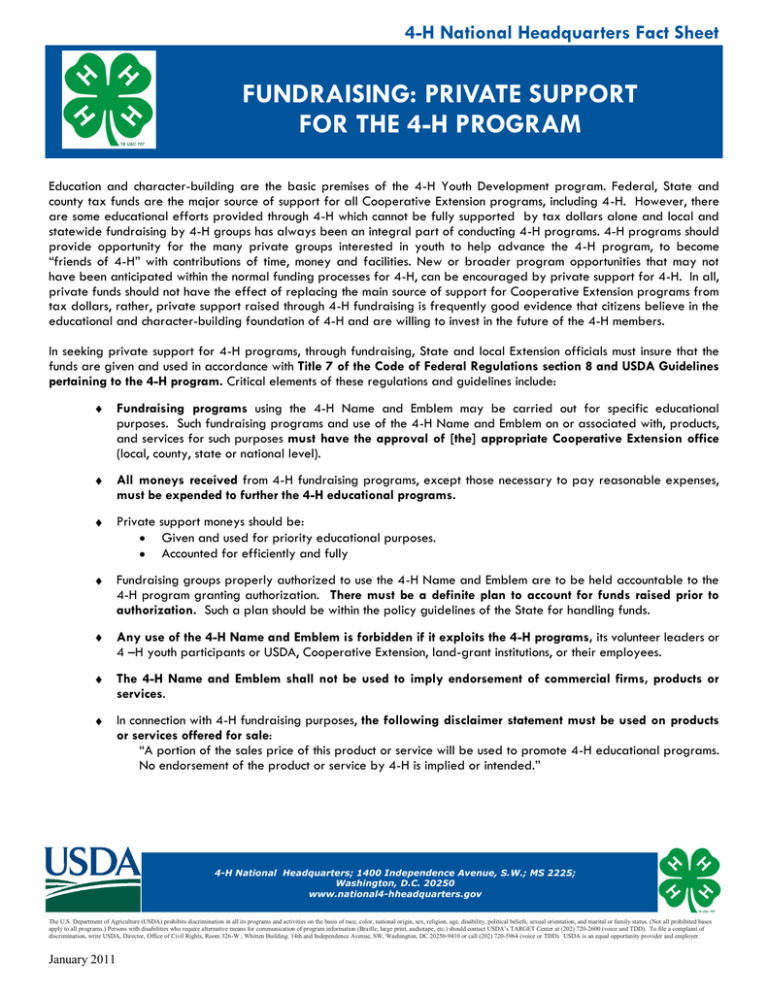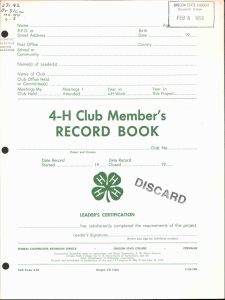
4-H National Headquarters Fact Sheet
FUNDRAISING: PRIVATE SUPPORT
FOR THE 4-H PROGRAM
Education and character-building are the basic premises of the 4-H Youth Development program. Federal, State and
county tax funds are the major source of support for all Cooperative Extension programs, including 4-H. However, there
are some educational efforts provided through 4-H which cannot be fully supported by tax dollars alone and local and
statewide fundraising by 4-H groups has always been an integral part of conducting 4-H programs. 4-H programs should
provide opportunity for the many private groups interested in youth to help advance the 4-H program, to become
“friends of 4-H” with contributions of time, money and facilities. New or broader program opportunities that may not
have been anticipated within the normal funding processes for 4-H, can be encouraged by private support for 4-H. In all,
private funds should not have the effect of replacing the main source of support for Cooperative Extension programs from
tax dollars, rather, private support raised through 4-H fundraising is frequently good evidence that citizens believe in the
educational and character-building foundation of 4-H and are willing to invest in the future of the 4-H members.
In seeking private support for 4-H programs, through fundraising, State and local Extension officials must insure that the
funds are given and used in accordance with Title 7 of the Code of Federal Regulations section 8 and USDA Guidelines
pertaining to the 4-H program. Critical elements of these regulations and guidelines include:
Fundraising programs using the 4-H Name and Emblem may be carried out for specific educational
purposes. Such fundraising programs and use of the 4-H Name and Emblem on or associated with, products,
and services for such purposes must have the approval of [the] appropriate Cooperative Extension office
(local, county, state or national level).
All moneys received from 4-H fundraising programs, except those necessary to pay reasonable expenses,
must be expended to further the 4-H educational programs.
Private support moneys should be:
Given and used for priority educational purposes.
Accounted for efficiently and fully
Fundraising groups properly authorized to use the 4-H Name and Emblem are to be held accountable to the
4-H program granting authorization. There must be a definite plan to account for funds raised prior to
authorization. Such a plan should be within the policy guidelines of the State for handling funds.
Any use of the 4-H Name and Emblem is forbidden if it exploits the 4-H programs, its volunteer leaders or
4 –H youth participants or USDA, Cooperative Extension, land-grant institutions, or their employees.
The 4-H Name and Emblem shall not be used to imply endorsement of commercial firms, products or
services.
In connection with 4-H fundraising purposes, the following disclaimer statement must be used on products
or services offered for sale:
“A portion of the sales price of this product or service will be used to promote 4-H educational programs.
No endorsement of the product or service by 4-H is implied or intended.”
4-H National Headquarters; 1400 Independence Avenue, S.W.; MS 2225;
Washington, D.C. 20250
www.national4-hheadquarters.gov
The U.S. Department of Agriculture (USDA) prohibits discrimination in all its programs and activities on the basis of race, color, national origin, sex, religion, age, disability, political beliefs, sexual orientation, and marital or family status. (Not all prohibited bases
apply to all programs.) Persons with disabilities who require alternative means for communication of program information (Braille, large print, audiotape, etc.) should contact USDA’s TARGET Center at (202) 720-2600 (voice and TDD). To file a complaint of
discrimination, write USDA, Director, Office of Civil Rights, Room 326-W , Whitten Building. 14th and Independence Avenue, SW, Washington, DC 20250-9410 or call (202) 720-5964 (voice or TDD). USDA is an equal opportunity provider and employer.
January 2011
4-H National Headquarters Fact Sheet
The U.S. Department of Agriculture (USDA) prohibits discrimination in all its programs and activities on the basis of race, color, national origin, sex, religion, age, disability, political beliefs, sexual orientation, and marital or family status. (Not all prohibited bases
apply to all programs.) Persons with disabilities who require alternative means for communication of program information (Braille, large print, audiotape, etc.) should contact USDA’s TARGET Center at (202) 720-2600 (voice and TDD). To file a complaint of
discrimination, write USDA, Director, Office of Civil Rights, Room 326-W , Whitten Building. 14th and Independence Avenue, SW, Washington, DC 20250-9410 or call (202) 720-5964 (voice or TDD). USDA is an equal opportunity provider and employer.


